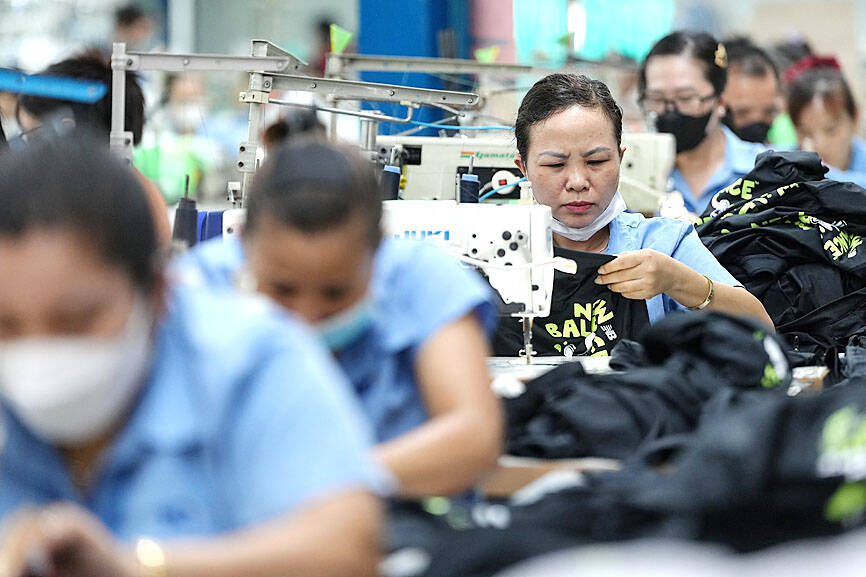US and Vietnamese businesses have asked US President Donald Trump’s administration to delay its planned 46 percent tariff on Vietnamese goods, saying the levy would hurt them and bilateral commercial relations.
The Vietnam Chamber of Commerce and Industry (VCCI) and the American Chamber of Commerce (AmCham) in Hanoi expressed concern to US Secretary of Commerce Howard Lutnick in a letter dated on Saturday, saying the tariff, to take effect on Wednesday, was “shockingly high.”
“Lower tariffs for products coming into Vietnam, and for products reaching the American consumer is what will help US companies, the economy, and consumers,” AmCham and VCCI said in a statement. “Higher tariffs will not.”

Photo: AFP
The Southeast Asian country, a major regional manufacturing base for many Western companies, posted a trade surplus of more than US$123 billion with the US, its largest export destination, last year.
Trump and Vietnamese President To Lam agreed on Friday to discuss a deal to remove tariffs, both said after a phone call that Trump called “very productive.”
Even before Trump’s Wednesday announcement of sweeping global tariffs, Vietnam cut several duties as part of a series of concessions to the US, which also included pledges to buy more US goods, such as planes and agriculture products.
Meanwhile, Hong Kong Financial Secretary Paul Chan (陳茂波) on Sunday said that US tariffs undermine international trade and would ultimately hurt Americans.
There are no winners in trade wars, Chan wrote in a blog, adding that the levies imposed by Trump had dragged down the US stock market.
Chan at a seminar on Saturday said that the territory would not impose countermeasures on the US.
The territory’s government “of course, strongly opposes the actions by the US, and we also need to be defensive,” Chan said.
Still, Hong Kong should remain “free and open,” and has a mechanism to identify risks that could threaten the financial system, he said.
Trump announced global tariffs, including a 34 percent charge on imports from China, which also apply to Hong Kong.
Last year, the US accounted for 6.5 percent of Hong Kong’s overall merchandise exports, Chan wrote.
Meanwhile, the territory’s shipments to Southeast Asia and the Middle East have been growing, with Southeast Asia becoming its second-largest merchandise export market, the financial secretary said.
Additional reporting by Bloomberg

IN THE AIR: While most companies said they were committed to North American operations, some added that production and costs would depend on the outcome of a US trade probe Leading local contract electronics makers Wistron Corp (緯創), Quanta Computer Inc (廣達), Inventec Corp (英業達) and Compal Electronics Inc (仁寶) are to maintain their North American expansion plans, despite Washington’s 20 percent tariff on Taiwanese goods. Wistron said it has long maintained a presence in the US, while distributing production across Taiwan, North America, Southeast Asia and Europe. The company is in talks with customers to align capacity with their site preferences, a company official told the Taipei Times by telephone on Friday. The company is still in talks with clients over who would bear the tariff costs, with the outcome pending further

A proposed 100 percent tariff on chip imports announced by US President Donald Trump could shift more of Taiwan’s semiconductor production overseas, a Taiwan Institute of Economic Research (TIER) researcher said yesterday. Trump’s tariff policy will accelerate the global semiconductor industry’s pace to establish roots in the US, leading to higher supply chain costs and ultimately raising prices of consumer electronics and creating uncertainty for future market demand, Arisa Liu (劉佩真) at the institute’s Taiwan Industry Economics Database said in a telephone interview. Trump’s move signals his intention to "restore the glory of the US semiconductor industry," Liu noted, saying that

NEGOTIATIONS: Semiconductors play an outsized role in Taiwan’s industrial and economic development and are a major driver of the Taiwan-US trade imbalance With US President Donald Trump threatening to impose tariffs on semiconductors, Taiwan is expected to face a significant challenge, as information and communications technology (ICT) products account for more than 70 percent of its exports to the US, Chung-Hua Institution for Economic Research (CIER, 中華經濟研究院) president Lien Hsien-ming (連賢明) said on Friday. Compared with other countries, semiconductors play a disproportionately large role in Taiwan’s industrial and economic development, Lien said. As the sixth-largest contributor to the US trade deficit, Taiwan recorded a US$73.9 billion trade surplus with the US last year — up from US$47.8 billion in 2023 — driven by strong

STILL UNCLEAR: Several aspects of the policy still need to be clarified, such as whether the exemptions would expand to related products, PwC Taiwan warned The TAIEX surged yesterday, led by gains in Taiwan Semiconductor Manufacturing Co (TSMC, 台積電), after US President Donald Trump announced a sweeping 100 percent tariff on imported semiconductors — while exempting companies operating or building plants in the US, which includes TSMC. The benchmark index jumped 556.41 points, or 2.37 percent, to close at 24,003.77, breaching the 24,000-point level and hitting its highest close this year, Taiwan Stock Exchange (TWSE) data showed. TSMC rose NT$55, or 4.89 percent, to close at a record NT$1,180, as the company is already investing heavily in a multibillion-dollar plant in Arizona that led investors to assume